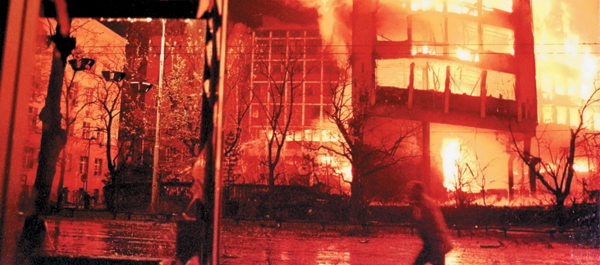On March 24, 1999, NATO began what would become a 78-day air campaign against Serbia to stop the bloody rampage of Slobodan Milosevic’s forces against Albanians in Kosovo. NATO and its allies called this a “humanitarian war,” as its bombs targeted only military and government installations and led to the withdrawal of Milosevic’s troops.
Sure, they hit military targets, but only 20 meters from one of the biggest maternity hospitals in the Balkans, the one where I was born
Serbian writer Jasmina Tesanovic—among the few Serbs who dared to speak out against Milosevic’s repressive regime—found little humanitarian about the war. Living with her 13-year-old daughter in the Serbian capital of Belgrade, she kept a diary and e-mailed entries to friends in other countries. Posted to the Web, her dispatches ricocheted around the world and offered a glimpse of how the Serbian people paid for a war waged to stop the crimes of their leader.
March 28 Belgrade is rocking, shaking, trembling. We are entering the second phase of NATO intervention. The sirens went off today for nearly 24 hours. I had to go out to buy some food, though we are not really starving yet, at least not keeling over. People are either taking tranquilizers or crying. People sheltering in the stations have been living inside the trains for days. At first they were restless, hanging round the platforms and on the escalators. Now they barely have room to sit down and the air is stale. To me, it looks like a trans-Siberian journey to nowhere.
March 30 My father used to dream of bombing long after the Second World War ended. He would wake up during the night, take me out of my bed, and carry me down to the basement. I remember him doing it, and last night I did it myself, carrying my daughter to safety several times. I feel sick both emotionally and physically. I feel like sleeping and sleeping forever—or until peace returns.
April 1 One thing I’ve noticed: Every evening at dusk my hands start to tremble uncontrollably. It goes on for a few hours. I heard that some other women have the same symptoms. It’s fear of air raids after dark. The men behave differently. They shout and argue about life and death. We’re more afraid of their deaths than our own. Only at certain moments, when I’m struck by images of violence against my children, I feel faint with fear. I think I would prefer suicide.
April 2 Today is Catholic Good Friday and people are getting mystical because of the bombs. They see portents everywhere, in the patterns of days, in the clouds that prevent air strikes, as if they were celestial signs of destiny. Another blow to the common sense of ordinary people.
April 3 It is morning, a beautiful sunny morning, and I am crying. Last night, the center of Belgrade was bombed with appalling precision; sure, they hit military targets, but only 20 meters from one of the biggest maternity hospitals in the Balkans, the one where I was born and where I had my baby. The Ministry of the Interior was destroyed; some of my friends remember being interrogated there. I am pleased by NATO’s accuracy. But I feel at the mercy of those young pilots, responsible for hitting military targets without harming a single newborn baby.
April 10 Tomorrow is Orthodox Easter. My daughter painted eggs—not that we’re religious, but she said she was bored and I thought, Better to let her do something constructive rather than sulk alone in her room waiting for the sirens to go off. She is a child of war now. She said yesterday, “I have a feeling I’m going to be killed when I’m 16, so what’s the point of going to school anymore?”
April 12 I couldn’t get to sleep last night so finally I took a tranquilizer. All these weeks I’ve put off using drugs to stay sane, but I realize that it’s impossible to stay sane in Belgrade without them. I understand those who leave. I could have been one of them, but I don’t want to leave my city, my friends, my language. Friends from all over the world offer me flats, money, help, but the only thing I need from them is to try to stop the war.
April 15 In the middle of the night, the windows started to rattle like in a horror movie and the sky was lit up by fire. My daughter woke up screaming and clung to me. She is bigger than I am now, but suddenly she seemed like a little baby. I was so exhausted I could hardly open my eyes. She was afraid but she didn’t want to go down to the shelter. She asked: “What’s happening? What’s all the noise?”“It’s our antiaircraft, darling, don’t be afraid,” I said. It was the first time since the war started that I made a distinction between “our” weapons and “their weapons.”
April 18 It’s Sunday, but who cares? We have been living the same day ever since the war started. In Belgrade there are efforts at normality—the traditional marathon held in heavy rain; there was a big wedding on TV—but personally, I’m done with anything that resembles human life. I’d rather be a cockroach at this point, much safer.
Adapted from The Diary of a Political Idiot. Copyright © 2000 by Jasmina Tesanovic. Published by arrangement with Midnight Editions, an imprint of Cleis Press.






